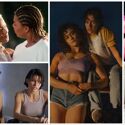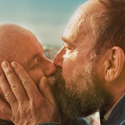Hollywood screenwriter Dustin Lance Black has been swimming in the deep end for quite some time now: After earning his chops writing for HBO’s Big Love, he nabbed an Academy Award in 2009 for writing the script to Milk, Gus Van Zant’s bio-pic about slain gay-rights leader Harvey Milk. He also penned the screenplay for J. Edgar, another high-profile bio-pic, directed by the legendary Clint Eastwood.
Black even stood up to the President in a controversial Hollywood Reporter piece that called both Obama and Romney to task for being “up in the air” about gay marriage.
But his new film, Virginia, might just be Black’s most daring endeavor yet: An extremely personal project, it marks the first time the Hollywood golden boy has both directed and written a major feature film. “Except for a couple of horrible videos I made in college that got released as features,” he jokes while chatting with Queerty’s Dan Avery.
That’s the price of fame—once you become a hit, everything you’ve ever done is up for grabs.
How about we take this to the next level?
Our newsletter is like a refreshing cocktail (or mocktail) of LGBTQ+ entertainment and pop culture, served up with a side of eye-candy.
Virginia is both the title of the movie and the name of its main character (played by a stellar Jennifer Connelly), a single mother battling both mental illness and a fearful future: Her relationship with a married Mormon sheriff (Ed Harris) isn’t going anywhere, a pesky social worker keeps banging on her door, and her teenage son and protector (Harrison Gilbertson) is itching to leave the nest.
Is it any wonder she retreats to a fantasy world to cope? “It’s what you [do], that aspirational thing that Southerns have that helps you survive,” says Black.
Below, the filmmaker talks about about getting Virginia made, whether Mormons are bullies and the film’s connections to his own life.
Was it daunting directing your own movie after working with people like Gus Van Sant and Clint Eastwood?
Oh yeah! I had come from working with Gus, and have since worked with Clint, and they have a filmmaking family—a crew they’ve worked with for years. They have a shorthand when it comes to creative conversations. So it was daunting to try and build that. I think I succeeded in some ways, and didn’t in others. I hope I get another shot to build that family.
A viewer doesn’t have to be Freud to see some elements of your life in the film. How autobiographical is Virginia?
Its incredibly autobiographical in a thematic way. The characters are a bit different, the names and places have changed. But I grew up a poor Mormon kid in the South with a mother with a disability. My mother’s disability was different—she was paralyzed from polio. I would tell that story to people once I had gotten a little drunk on some whiskey—the stories of what we did to survive and what roles I had to take on—and I would get these long faces. And I just thought, you don’t understand Southern, you don’t understand Mormon.
Was there that kind of flight from reality in your family?
We lived in a dream. It’s what you did, that aspirational thing that Southerns have that helps you survive. And its only magnified by being Mormon, because now you have someone telling you this life is just a test. So you’re aspirational and dreamy not just in this life, but in the next one too. Where my mom will have a perfect body, and we’ll have a big wonderful family and pick the colors of everything in Heaven.
Jennifer Connelly is amazing in the film, and her role is a real departure from what we’ve seen her in before. Did she bring a lot of her own ideas to the part or was that all you?
Probably two years before Milk, I met with her here in New York at the Bowery Bar and she just really responded to the script. She said she saw a lot of herself in Virginia. And I had never met her before, I had a lot of those same concerns. But what you don’t realize is that, in real life, she’s really, really funny. You don’t seen that on the screen all the time. She was down to do whatever, and take it anywhere. She became my real ally. This film was made on an incredibly small budget under some really difficult conditions. Virginia could not have been made without Jennifer Connelly, both as an ally for the film early on and on the set, willing to do whatever.
Ed Harris plays Virginia’s lover, and he’s basically a bastard and a bully—and a Mormon. With what’s come out about Mitt Romney’s past, did that strike a chord with you, this idea of Mormons as bullies?
I was surprired that Mitt Romney attacked a gay kid when he was younger. I grew up Mormon, I grew up surrounded by Mormon men. There’s a lot of judgment inside, in Mormon men’s hearts but Mormons aren’t violent—not today, anyway. No, I think that kind of attack is particular to Mitt Romney. Which is what makes it so horrifying.
It actually speaks to another character flaw in him—that he lacks empathy. And that’s a frightening character trait for a presidential nominee to have.
Virginia opens in theaters on May 18. Photos: Entertainment One.



















Cam
Cue the people to come in screaming about how Queerty should never post up anything about this guy because he once had unprotected sex and should now be set on fire and crucified. (Eye Roll)
AEH
DLB is just awesome as all get out. He’s handsome, intelligent, sensitive, and brilliant. So what if he had unprotected sex? I’m sure they were careful.
Anyway, I look forward to his future projects.
Wendy
So what everybody from straights to gays have sex without condoms – who gives a fuck. I bet brad Pitt is having sex with Jolie bareback, Jennifer Lopez with Casper, so who gives a fuck if Dustin had sex bareback or not – people should mind their own fucking business how a person has sex.
Rev Jeff
Southerns? Southerners. In Alabama, we call ourselves Southerners. Have we gotten it wrong all these years?
Delius
Why are there so many Dustin Lance Barelback stories on Queerty?
As for his bareBlacking, it matters because he was a campaigner AGAINST bareBlacking.
Delius
@Cam: Oh, it was ONLY one time. The one time this bareBlacking campaigner had unprotected sex they happened to take photos?
Yeah, right.
He’s a total hyppocrite.
the other Greg
“And I just thought, you don’t understand Southern…”
Southerners are always so sure they are all so incredibly interesting and that everyone else should be endlessly fascinated with them.
@Delius: “Do as I say, not as I do” seems to be a Southern thing. That must be why they have the highest divorce rates in the country, despite their pompously lecturing everyone else about marriage, and the most unwanted rugrats, despite lecturing everyone else on the proper raising of children. So maybe to DLB, telling everybody else not to bareback was one of those Southern cultural bullshit things.
John T
I’m from a small town in Georgia and we will probably not get Virginia here when it comes out. I want to see it though. Seems like it would be a good film. I’m a huge fan of DLB. He seems to ferret out the small details that make his stories so interesting. On a side note, I agree with Wendy about what you do in your private life. So what if he had unprotected sex. He of all people knows the risks involved, not everyone does. That is why campaigns about safer sex practices are important. In reality, the only real way to have safe sex is to not have sex at all.
Alistair
enough of this douche.
sick of his i dont practice what i preach bull.
great you found a pix of him wearing a hat.
so, sick of his little boy, hair hanging down hair style.
he is not a teenager anymore..enough with that hair style.
he makes me so sick!!!!
UsualPlayers
Sounds interesting, I may check it out.
Cam
To all of the people attacking him because he had sex without a condom.
You seem to have forgotten where the push for safe sex came from. It was to avoid AIDS. You have now, in your mind, somehow forgotten that that was the reason for it and now just seem to think that it is sex that is evil.
Twisted Twisted people.
The enemy is NOM, the right wing, the Mormon church etc… For you to waste time attacking some guy for having sex is beyond hypocrisy.
jj
@Cam: your comment makes absolutely no sense. People are calling him a hypocrite because he promoted safe sex and then let some dude come in his ass…ok?
Ron Jackson
wow, so much hate here. The guy is human. Don’t tell me none of you posters above have ever done something you regretted? Sometimes men think with their cocks and not their brains. Get over it.
the other Greg
@Cam: (sigh) Cam, we went through all this last week. The only one using the word “evil” is you. And there is a LOT more to gay sex than barebacking. You really should get out more, dude.
Charlie
He told gay kids they are loved in an Oscar speech – I think we can let go of a couple of pictures that were intended for his personal use. Really people: baby/bathwater
Jorval
I don’t give a rat’s ass what he does in bed. I don’t like him simply because he’s a Liar.
A few weeks back he claimed Romney and Obama were up in the air about gay marriage. Granted, this was before Obama came out in favor of it, but even suggesting Romney is undecided is a complete and utter lie.
AEH
Haters gonna hate!
Kyle412
I love Ed Harris. Sad to say I won’t see this movie because of Dustin Lance Black’s involvement. I don’t like the mix the message he sends our community and won’t help fill his wallet.
tookietookie
I disagree with what he said that violence isn’t in Mormon men’s hearts generally. I grew up Mormon. Lack of empathy is a problem across the board with that religion. Romney attacking a gay kid, the dog on the roof of the car thing…c’mon DLB…you know these people. You know how they are.
Belize
@Delius: Three years prior to the actual start of the campaign as far as evidence is concerned. Of course, I wouldn’t be surprised if you’re one of those conservatives that are mentally incapable of taking in new information. :)Don’t worry, your brain is not a lone.
Belize
@Alistair: “A few weeks back he claimed Romney and Obama were up in the air about gay marriage. Granted, this was before Obama came out in favor of it, but even suggesting Romney is undecided is a complete and utter lie.”
LOL. Yes. Because that’s how it is to you people, right? If a person has an OPINION you don’t like, it’s called a “lie.” It’s a great way to compensate your lack of intellect, I’m sure. 🙂
LadyL
Yeah, I’m sure NOBODY on this site has ever done things they’re not proud of, or ever been inconsistent in the ways they conduct their lives… guys, he’s human. Move on. It’s an election year and there are real enemies out there.
Belize
@jj: “your comment makes absolutely no sense. People are calling him a hypocrite because he promoted safe sex and then let some dude come in his ass…ok?”
And your mindset does? Those pictures were taken years before he decided to campaign against it. As a user here once said, if I may paraphrase, is that the most laughable thing about you mindlessly hostile queens is that when people change, you call them hypocrites. LOL. Yes. That’s why our community is in dire straights. You people are still around. 🙂
Belize
@LadyL: Honey. Don’t bother. These people probably got turned down when they offered their bare dicks to Black. 🙂
@Alistair:
“so, sick of his little boy, hair hanging down hair style.”
And I’m sure that this hairstyle is a grievance for morons like you who are good for nothing but tilling the earth. In other news, people have the right to wear their hair in whatever way they like.
“he is not a teenager anymore..enough with that hair style.”
LOL. I wouldn’t be surprised if you’re still a teenager given the childishness of your grievances against another person. Perhaps you’re the one who should grow up.
UsualPlayers
I don’t see what his personal life has to do with his movie or gay rights.
If everyone is looking for a saint or someone who has never made a mistake to lead gay rights efforts or as a prerequisite to watching a filmmaker’s movie, you will be waiting for an eternity.
I am guessing this is something about our culture. We want saints. Look, he may indeed be a hypocrite. So what. Why does it matter to you?
Chadboy
Why is it that so many people on this site revert to the defense “we all make mistakes”? Speak for yourself. There is a difference between running a red light, gossiping or wearing the wrong outfit for most of us on here. We are not and don’t aspire to be in the spotlight. We don’t place ourselves out there as a spokesperson for the LGBT community. DLB does. There is also a difference if a mistake is made when you are a teenager or even in your early 20s since this is the time you are learning about right and wrong. In Dustin’s case he is pushing 40 and the pics were taken in his 30s. HIV/AIDS has been a plague for close to 30 years. He speaks on college campuses about safe sex. He is a hypocrite. If it were 1980 and nobody had ever heard of AIDS I would cut him some slack.
UsualPlayers
Actually its not about whether anyone makes mistake,s including you Chad, its about why do you care. You still haven’t really done that other than to continue to tell us that you are. Your comments aren’t a link based on logic. Its just your personal outrage. Why do you think its matters is left to the imagination of your audience. But, I know- this is online. You aren’t required to actual have a cogent thought about why anyone else besides you should care.
Chadboy
@UsualPlayers:
Your comment makes no sense. Next time you type a response make sure you are sober.
Chadboy
If I shouldn’t care to state my opinion then why do you care to state yours? Blogs wouldn’t exist if we were all in agreement.
Lefty
Sure, he’s young, good looking, talented, rich, successful and probably gets more cock than most of us combined will ever see in our entire lives… but is he really happy?
That’s what I ask myself.
UsualPlayers
Chad
With your level of IQ, I can understand why you are confused. You state your opinion as if you have explained why its important to ramble on about this guys sex life in an article about his movie and public activism for the gay community.
You can, of course, continue to babble on about any number of irrelevant topics, but it does naturally raise the question of “why do you care” because the topic is not about his sex life at all. Blogs hopefully exist for the purpose of people talking to each other about the topic being discussed rather than a place for Chad to ramble on about unconnected subject. If not, then, we can all just talk off topic about whatever comes to mind.
I can discuss French Poodles. Why? because its a blog, and I am allowed to babble about irrelevant things in my comment. You have the right to do so. It just doesn’t make you sound very bright.
AEH
lol @ the personal attacks.
tj
Im more offended by his hair and inflated sense of self than any barebacking or whatever
the other Greg
I’m getting this image of Andrew Sullivan reading these comments and bursting into tears. “We all make mistakes! Why don’t they ever defend ME when I make mistakes? It’s just like school, the cute boys get away with anything!” (snif, boo hoo hoo)
Chadboy
I’m not babbling. If you care to have your IQ tested against mine I’m happy to.@UsualPlayers:
I’m not babbling. If you care to have your IQ tested against mine I’m happy to. I wasn’t discussing poodles. I understand how you might be confused by DLB’s hair and thinking he is a poodle, but I was simply stating that I wouldn’t spend money on his film since he is a hypocrite.
Carlos
DLB is an idiot and his movies suck. The way he’s a complete hypocrite with everything not just barebacking is not surprising. He gives all LGBT people a bad name.
Dave
@4 Wendy-You realize that those other celebrities are either monogamous and/or fluid bonded with each other and they’re not having unprotected sex with a male prostitute like Dustin Lance Black did. Dustin Lance Black can do it raw with all of the male prostitutes he wants in Los Angeles but it just makes him a hypocrite and it wouldn’t be surprising if he’s poz.
Wendy
To No. 37
My Dear Dave
Sweetie let Dustin do whatever he wants – that’s his problem. Deep down we dont know if them celebrities are doing more scandalous stuff than Dustin. Anyone can live a secret life and we wont know about it… Let people live and let them do what ever they want – is their choice in their own worlds…